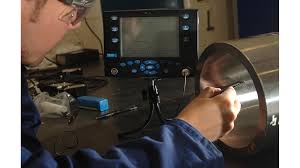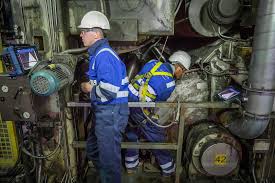Corrosion under insulation is a common and potentially dangerous issue in the industrial sector, particularly in countries with hot climates like Egypt. Non-destructive testing (NDT) has proven to be a valuable tool in addressing this issue, allowing for the detection and assessment of corrosion without the need for costly and time-consuming insulation removal. In Egypt, where industries such as oil and gas, petrochemicals, and power generation are prevalent, the need for effective corrosion under insulation NDT solutions is paramount. This paper aims to explore the challenges and opportunities of addressing corrosion under insulation with NDT in Egypt, providing insights for industry professionals and researchers working in this field.
Addressing Corrosion Under Insulation (CUI) with Non-Destructive Testing (NDT) in Egypt involves using various NDT techniques such as ultrasound, radiography, and thermography to detect and assess CUI without disturbing the insulation. This is essential in ensuring the integrity of industrial equipment and avoiding potential safety hazards. NDT plays a crucial role in effectively managing CUI in Egypt's industrial facilities, including oil and gas refineries, petrochemical plants, and power generation facilities. By proactively identifying and addressing CUI through NDT, companies in Egypt can minimize the risk of equipment failure and costly downtime. Additionally, proper implementation of NDT for CUI management can help ensure compliance with industry regulations and standards.
Understanding Corrosion Under Insulation NDT in Egypt
industrial non destructive testing

Understanding Corrosion Under Insulation NDT in Egypt is crucial for maintaining the integrity and safety of industrial equipment and infrastructure. This non-destructive testing (NDT) technique helps to identify and assess corrosion that occurs beneath insulation, which is a common and potentially serious issue in many industrial settings. By accurately detecting and monitoring corrosion under insulation, NDT helps to prevent costly damage and downtime, as well as ensuring compliance with safety and environmental regulations. In Egypt, NDT professionals and companies play a key role in implementing and advancing the understanding of corrosion under insulation NDT to protect critical assets and infrastructure.
The Impact of Corrosion Under Insulation in Egyptian Industries

The Impact of Corrosion Under Insulation in Egyptian Industries is a significant concern for the maintenance and safety of industrial equipment and infrastructure. Corrosion under insulation (CUI) occurs when moisture becomes trapped beneath insulation materials, leading to the degradation of metal surfaces. In Egyptian industries, this issue can lead to reduced equipment lifespan, increased maintenance costs, and potential safety hazards. Addressing CUI requires proper inspection and maintenance procedures, as well as the use of corrosion-resistant insulation materials and protective coatings. Unternehmen in Egypt should be vigilant in managing and mitigating the impact of CUI to ensure the longevity and reliability of their industrial assets.
Challenges and Solutions for Corrosion Under Insulation NDT in Egypt

Challenges for corrosion under insulation NDT in Egypt include limited access to equipment and technology, a lack of trained personnel, and variable regulatory standards. Solutions involve investing in advanced NDT equipment, providing comprehensive training for inspectors, and implementing standardized inspection and maintenance procedures. Collaboration between industry stakeholders and regulatory authorities can also help address challenges and improve the efficacy of corrosion under insulation NDT in Egypt.
Corrosion Under Insulation NDT Techniques in Egypt: A Detailed Look
Corrosion under insulation (CUI) is a significant challenge in industries such as oil and gas, petrochemical, and power generation. In Egypt, the use of non-destructive testing (NDT) techniques to detect and monitor CUI has become increasingly important. Several NDT techniques are commonly used in Egypt to address CUI, including ultrasonic testing (UT), radiography, and thermography. UT is often utilized to measure the thickness of the insulation and detect any corrosion or metal loss underneath. Radiographic testing can provide detailed images of potential CUI areas, while thermography is effective in identifying areas of insulation where elevated temperatures may indicate the presence of corrosion. Additionally, advanced NDT techniques such as guided wave ultrasonic testing (GWUT) and phased array ultrasonic testing (PAUT) are gaining traction in Egypt for their ability to provide accurate and comprehensive CUI inspections, especially in hard-to-reach areas. Moreover, the development of new technologies and methodologies in CUI NDT in Egypt is ongoing, with a focus on improving inspection accuracy, efficiency, and safety. This includes the use of robotics and drones for inspecting insulated equipment and pipelines, as well as the integration of digital data management and analysis tools. Overall, the application of NDT techniques for CUI detection in Egypt continues to evolve and expand, driven by the need to ensure the integrity and safety of industrial assets in the face of corrosion challenges.
Preventing Corrosion Under Insulation in Egypt: Best Practices
Preventing corrosion under insulation in Egypt involves implementing best practices such as using suitable insulation materials, ensuring proper installation techniques, and conducting regular inspections and maintenance. The high temperatures and humidity in Egypt can increase the risk of corrosion under insulation, making it crucial to use corrosion-resistant materials and coatings. Additionally, proper design and installation of insulation systems can help prevent moisture buildup and minimize the potential for corrosion. Regular inspections and maintenance are essential for identifying and addressing any issues early on, thereby extending the lifespan of equipment and infrastructure.
Corrosion Under Insulation NDT in Egyptian Oil and Gas Facilities
Corrosion Under Insulation (CUI) is a common issue in Egyptian oil and gas facilities due to the harsh environmental conditions and the use of insulation to maintain the temperature of equipment and pipes. Non-Destructive Testing (NDT) methods are used to detect and monitor CUI in these facilities. NDT techniques such as ultrasonic testing, radiography, and thermography are used to assess the extent of CUI and determine the integrity of the equipment and piping. These tests are crucial for ensuring the safety and reliability of the infrastructure in Egyptian oil and gas facilities. Regular inspections and monitoring using NDT methods are essential to prevent and mitigate the impact of CUI on the facilities.
Exploring the Future of Corrosion Under Insulation NDT in Egypt
ultrasonic testing ndt
Exploring the Future of Corrosion Under Insulation NDT in Egypt involves studying and determining the most effective methods for detecting and preventing corrosion under insulation in industrial equipment. This is crucial for maintaining the integrity and operational efficiency of various infrastructures in Egypt. NDT (non-destructive testing) techniques play a vital role in this process, as they allow for thorough inspection without causing damage to the equipment. Identifying and addressing corrosion under insulation issues can help prevent costly repairs, extend the lifespan of industrial assets, and ensure the safety of workers and the surrounding environment. As Egypt continues to develop its industrial sector, the exploration of advanced NDT techniques for corrosion under insulation will be essential for sustainable growth and safety.